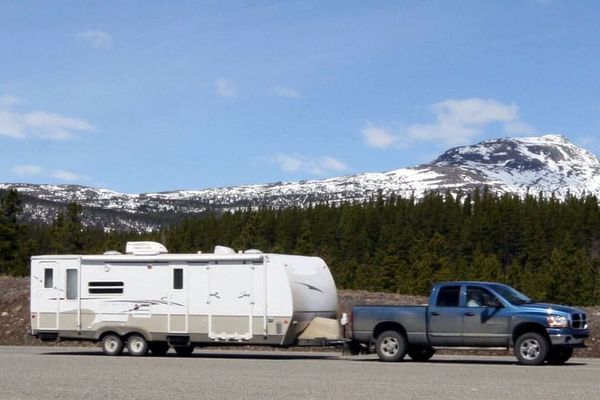
Hitch Weight vs Dry Weight: What Does Dry Hitch Weight Mean?
One of the more frustrating things about towing a trailer is all the abbreviations and the many weight limits you have to be concerned about. Fortunately, the dry and hitch weights do not have abbreviations to learn but they can still be confusing and frustrating.
To keep it simple, dry weight when referring to a trailer or any vehicle means the total weight of the vehicle when completely empty. There is no cargo, water, passengers, or other items in the trailer or vehicle. The same applies to the hitch as there are no propane tanks etc. On the tongue.
To learn more about these two weights and how they apply to towing, just continue to read our article. It has the information you want to know about so that you can tow more successfully than you have been. Take a few minutes to see how this information helps you.
What Does Dry Hitch Weight Mean?
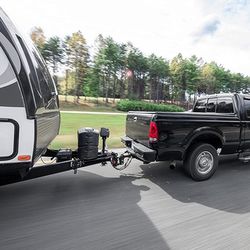
This can be a confusing term as there is such a thing as dry weight which has been described above. The definition is basically the same. The dry hitch weight is the weight on the hitch without any additives to the tongue.
Then you may be confused as to the difference between the tongue weight and the hitch weight. Don’t be as if those two items are one and the same. Then the same risk applies to the hitch weight.
If you overload the hitch, then you are asking for trouble. Just like you are when you put too many items in your trailer and go beyond the GVWR. You have to watch those weight limits if you want to tow safely.
Depending on the size of your trailer, your hitch weight may vary. The ideal hitch weight is going to be 10 to 15% of the overall weight of the trailer when loaded.
If you are not good at math, make sure you have a calculator on hand or at least someone who is good at math. You want to meet that weight limit to avoid any dangers that can crop up.
What is Hitch Weight vs Dry Weight?
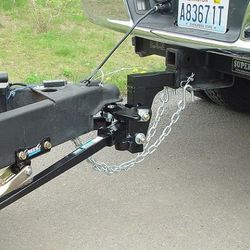
There is a difference between these two ratings. The hitch weight is the amount of weight that is placed on the hitch by attaching the tongue to it. As we said, this should be within the 10 to 15% of the total of the trailer weight.
Dry weight is the actual weight of the trailer when it is completely empty. This would include the weight of the tongue as it is part of the trailer frame. Dry weight means that there is no water or black water in the tanks.
Nor is there any gray water for that matter or any supplies, clothing, personal items, and equipment.
Also, there are no propane tanks, toolboxes, or other equipment sitting on the tongue of the trailer. To get an accurate dry weight reading, everything including your spouse has to be outside and off the trailer.
Dry weight simply means empty weight and hitch weight simply means how much weight is placed on the hitch when you attach the trailer to it.
Is Hitch Weight Included in Dry Weight?
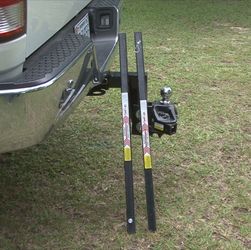
This is a good question that many people avoid answering. Hitch weight can also be described as the force placed on the hitch when it is attached to the hitch. It may or may not be included in your trailer’s dry weight.
However, it may be included in your GVWR weight limit. This is the gross vehicle weight rating and it factors in all the weights involved. Not just trailer associated weight but the hitch weight as well as the payload and tow vehicle weight.
The GVWR is the maximum amount of weight your tow vehicle can haul and tow at the same time. To illustrate this, if you have a truck that has a GVWR at 15,000 pounds and it weighs 5000 pounds and can haul 1500 pounds, that means your total trailer and hitch weight cannot exceed 8,500 pounds fully loaded.
That is with full propane tanks, full holding tanks, gear, supplies, and people. Your payload weight in this example would be the haul weight and that payload weight limit includes spouse, kids, dogs, and other passengers.
How To Figure Out Your Hitch Weight
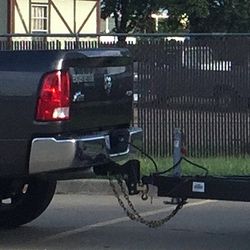
There is a simple equation you can use to figure out how much your hitch weight limit will be. The equation goes like this- GVWR divided by 15% = hitch weight.
If you need numbers, then 10,000 pounds multiplied by .15 = 1500 pounds for the hitch weight. It is a simple math equation that helps you make the right determinations when you want to add items to the tongue of your trailer.
Keep in mind that battery boxes, batteries, propane tanks, and tools and their toolboxes, etc., add up fairly quickly. If you put bike racks on your trailer’s tongue, you will have to account for the weight of the rack and the weight of the bicycles.
Everything you put in or on your trailer needs to be factored into the GVWR. The more weight you put on the tongue or in your trailer, the less weight you can carry in your tow vehicle.
It can get frustrating when you try to pack a lot of items so you do not need to buy anything when you are on the road.
Some Final Words
Understanding the different weight limits can be confusing and frustrating. It is the nature of owning a trailer and trying to tow it to your camp spot. You only have so much weight to work with then you have to start deciding what stays and what goes.
When it comes to hitch weight, too little may have the trailer swaying and too much may give you steering problems. You need to stay within that 10 to 15% range to have a safe towing time.

